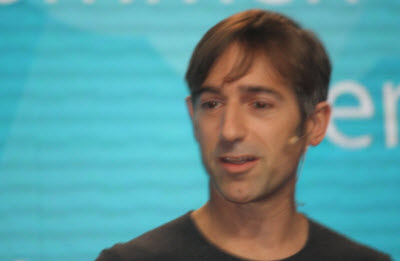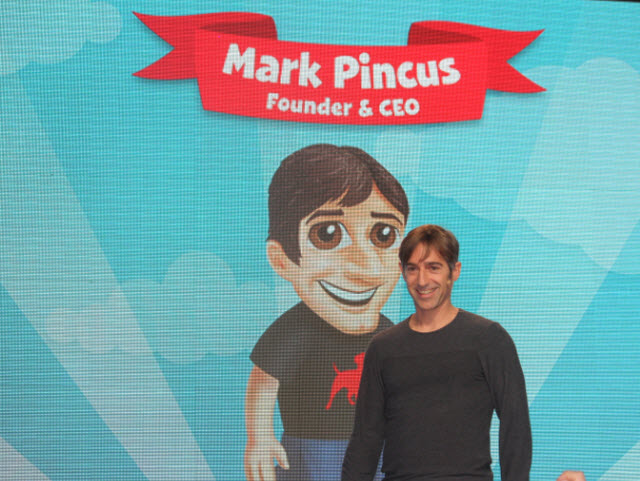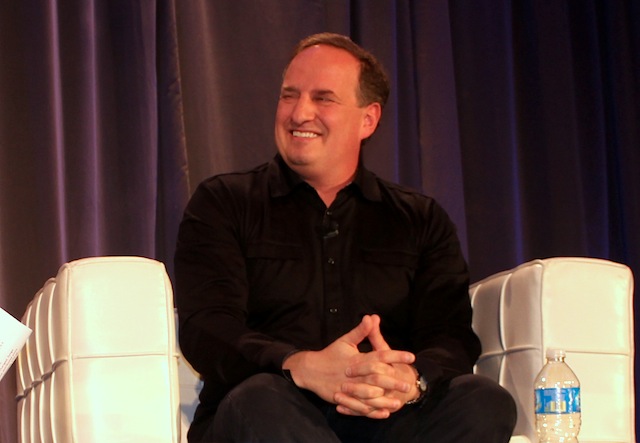 A more mature Pincus?
A more mature Pincus?
As Zynga’s culture matured, so did Pincus. He wasn’t quite as evil as the FarmVillains piece made him out to be, since there were dozens of employees from his previous startup, Support.com, who were working at Zynga. If he were such a jerk, why would anybody want to work for him again? He outlasted even the expectations of insiders who thought Zynga would bring in a more professional game industry CEO at some point.
To Bing Gordon, Zynga arose in a disruptive, game-changing time. Nobody rode out this period better than Pincus, Gordon said in the fall of 2010.
“He was prescient and it was wildly interesting to me,” Gordon said. “Mark has a spectacular insight when it comes to audience building, ease of use, and communication with friends.”
Gordon believed that Pincus wasn’t in it for the limelight. He said Pincus happily stayed in the shadows and was not jealous of his own employees’ successes. Reminded that he wrote a negative memo about Pincus’s leadership style early on, Gordon said, “Mark is a different person than he was then. I had said that Mark had never worked at scale before. In 2008, people thought that Mark could not run a big company. There was a previous board that threw him out. That was a concern for normal investors. My role was to make sure that didn’t happen.”
Early on, Pincus was tough on weak performers. He had to be told when he wasn’t talking like a CEO. When Colleen McCreary arrived as chief people officer in the spring of 2009, she had to help eliminate 30 employees who weren’t meeting goals. Over time, Pincus focused on areas that mattered the most, such as the business model, recruiting, partnerships, future investments, and the games themselves. In speeches like a talk at the Web 2.0 Summit, Pincus liked to wax poetic about a future where people played social games so much that the company could consider them perpetual customers. That was how users behave with established sites such as Amazon or Google. Pincus wanted to make Zynga into a destination, not just a passing fancy.
Gordon added, “I said to Mark, I think you can be a world-class CEO. For me, it felt like working at EA in the 1980s, but three times faster and with smarter people.”
Gordon added, “Somebody who started four companies is smarter. You have to hire a lot of No. 1 draft picks, bet on them, give them authority, and take risks on them.”
There was a time when it seemed like investors might want to throw Pincus out of the company. He got a lot of negative feedback from employees. But the venture capitalists and the board didn’t have control of Zynga. Pincus still had a big ownership stake, and he had control of the board and voting power. Much like Mark Zuckerberg, he had been able to negotiate from a position of strength when it came to getting investments. So Pincus had more time than he otherwise might have to change his style and become more people-friendly. He learned to become the CEO of a very large company — something that he had never done before.
Not everyone agreed that Pincus is right for the job. Roger McNamee, a co-founder at Elevation Partners, told the New York Times, “Zynga should be an example of entrepreneurship at its best. Instead it’s going to be a Harvard Business School case study on founder overreach — this will be a cautionary tale.”
It’s worth noting, however, that McNamee was the former business partner of John Riccitiello, CEO of Zynga’s arch rival EA. Of course he would say that. Still, there were some problems. Andrew Trader, one of the earliest employees at Zynga, had left the company in March 2010. Later on, Pincus attempted to take back some of his stock option awards. Trader reportedly had to get a settlement from Zynga. That reported happened to others, according to the Wall Street Journal, and such “clawbacks” didn’t sit well with some people. Those clawbacks would later come back to haunt Pincus.
Building the zCloud
Zynga’s whole game network was possible because of the rapid growth of internet infrastructure and new “cloud computing” solutions such as Amazon’s web services, where it rented out computing power from its data centers to small companies. That helped Zynga create a a flexible cloud infrastructure, said Cadir Lee, chief technology officer, in an interview in the fall of 2010.
Zynga started with a hosted infrastructure. It moved to a public cloud, adopting Amazon Web Services, when FarmVille took off. That meant it could tap Amazon’s data centers whenever the demand justified it. After a while, in 2010, Zynga started to create its own private data centers, dubbed the zCloud, as it became bigger and bigger. It was a hybrid approach that let Zynga use its own private data centers as well as Amazon’s public cloud, depending on its needs.
The bill to do this wasn’t cheap. Zynga would spend more than $199 million on infrastructure in 2011, up from $62 million the year before. But the hybrid public-private cloud could do what Amazon did, with lower costs. Now that it had a bunch of major games that were all in their various stages of life, Zynga could move around servers as needed. By making investments in its own data centers, Zynga could save money. If, for instance, it figures out how to reduce power usage, the costs savings will flow to Zynga’s bottom line, not Amazon’s.
FrontierVille benefited from a lot from what Zynga had learned running FarmVille, Lee said. Zynga considered its analytics, storage, cloud computing, and game applications architecture to be competitive advantages for the company. Many of the games shared code and functions. Zynga gathered data and then spit it back out in a form that can help the game designers create better games for users. It also had a huge investment in security to protect its virtual goods from hackers.
The company could now grow its users by tens of millions or lose that many in a matter of weeks. It could move games on or off its own private cloud, known as the zCloud, as needed. In a 24-hour period, Zynga could add or subtract 1,000 servers in an automated fashion. It could deliver more than a petabyte of content per day, and its storage was now in the tens of terabytes. (Later, Zynga would say it processed 15 terabytes of game data per day.) Still, every now and then, Zynga had outages, partly because of its dependence on Amazon.
But owning data centers also came with risks. If the demand for Zynga’s games were to drop dramatically, as has happened on occasion, Zynga would get caught with too much infrastructure on its hands and losses could result. That’s probably why Zynga will likely own part of its data centers and will rely on external hosts for the rest.
Allan Leinwand (pictured above), the CTO for infrastructure engineering, said that Zynga preferred flexibility. It appreciated the four-door sedan that Amazon offered, but he said there were times when Zynga’s applications needed something different.
“Maybe one day you want a sports car, maybe another you want a Winnebago,” Leinwand said. “A four-door sedan is what you’re getting with the public cloud. Once we knew our app, we knew we needed to be flexible. We made zCloud better for our games. Amazon is making a great platform, but we wanted a sports car for some applications and an 18-wheeler for certain applications. We needed to customize the cloud to meet the needs of our players.”
In any event, the fact that Zynga was considering such an option of owning its own data centers puts it into rare company. Only the biggest companies, such as Facebook, Google, and Apple, have invested in owning their own data center operations, when their user counts run into the hundreds of millions of users. And thanks to their cloud operations, those companies have the closest relationships with customers and that is why they believe they will rule the world.
 Going GlobalVille
Going GlobalVille
Zynga was thinking seriously in the spring of 2010 about how to restore its growth and position itself for an initial public offering. Beyond its Facebook empire and its data center infrastructure, it needed a global audience. The U.S. social game market had stalled in the post-viral era. But Facebook wasn’t the ruler in every overseas market. In places such as Japan, Zynga needed to find other ways into the market.
So, in June 2010, the company struck a deal with Japan’s Softbank investment firm, which also had rich holdings in mobile. Softbank agreed to invest $150 million in Zynga’s Japan operation. At that point, Zynga had raised more than $520 million to invest in social games, including an unannounced $100 million deal with Google, which was planning its own social network to challenge Facebook.
In April 2010, Zynga’s games were played by 252 million people every month. But many of the games were seeing people trickle away, so the company knew it needed to open new markets. In Japan, Zynga sought to expand into mobile games and produce local content for Japanese users. Masayoshi Son, CEO of Softbank, said he looked forward to working with Zynga to create a social game powerhouse. Zynga also believed it needed to be in Japan to understand the future of mobile behavior in the U.S.
Zynga also wanted to expand into the Asian markets, where free-to-play online games were born and customers were very receptive to virtual goods. The company started looking for overseas acquisitions and it built up an ability to launch its games in multiple languages on the same day.
As part of its expansion effort, Zynga launched the first international version of its Zynga Poker game in August 2010, launching the game in Mandarin Chinese for Facebook players in Hong Kong and Taiwan. The game had 28 million monthly active players already, but the localization effort was aimed at grabbing even more. Zynga had a voracious appetite for more users, and now it was willing to go to great lengths to get them.
Soon enough, Zynga was launching games in multiple languages on the very first day they launched. But in Japan, things weren’t going so well. Zynga was planning to launch games on both the web and on mobile. Big gaming networks operated by DeNA, Gree, and Mixi were growing fast in Japan. But the team didn’t execute well in startup mode in Japan. The games they created were late and weren’t big hits. If Zynga was going to break into the Japanese market, it was clearly going to take longer than it hoped.


